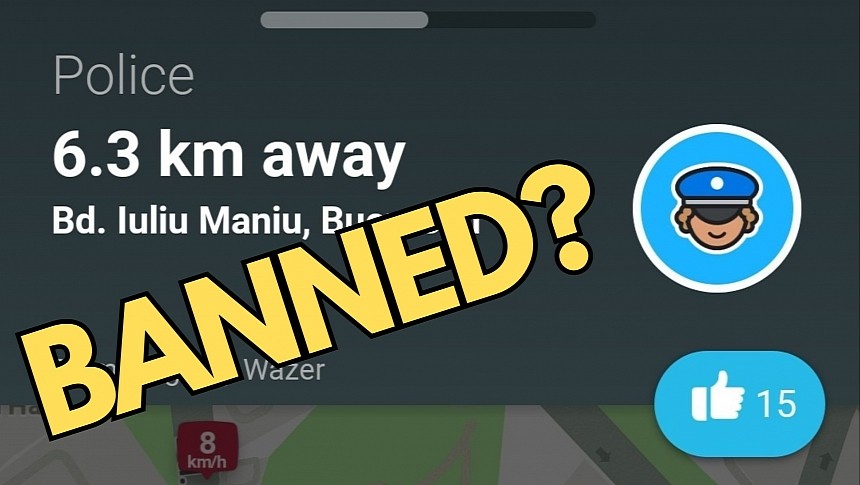A recent study conducted by Vias Traffic Institute in Belgium calls for a ban on police reports in applications like Waze.
The research paper highlights the problems of flagging the location of speed traps on the map and interacting with a mobile application, revealing that users sometimes get a false sense of security and get more fines than drivers not relying on such solutions.
Approximately 37% of Belgian drivers rely on speed camera warning systems, but despite using such solutions, they "report driving more fines for speeding per 10,000 kilometers than drivers without such a system." Vias' theory is that drivers who rely on these apps believe that a speed trap does not exist if it's not flagged on the map, so they can go over the limit without getting a ticket.
39% of the drivers who run Waze in their cars believe the purpose of speed cameras is "to raise money for the government," the study reveals. 21% of the respondents admit they go over the limit when they know there's no speed camera ahead.
Vias also warns that interacting with mobile apps increases the driver's distraction by requesting them to send reports or confirm the existence of speed traps. The gamification component of applications like Waze, which offers points for contributing to data accuracy, is concerning in its current form, with Vias explaining that drivers take their eyes off the road and look at the screen to interact with the app.
The traffic institute proposes several changes to the Belgian legislation, including new laws already in effect in France and Germany.
Vias says Belgium could adopt the "danger zone" concept currently used by France, which allows navigation apps like Waze to mark a potential area where a speed trap could be located but not its precise location. However, the institute says this approach could still cause distraction and allow drivers to avoid fines.
It's why a total ban on all systems that warn of speed cameras could be the right way to go, the study explains. Such legislation could send a "clear signal that it is unacceptable to undermine all types of enforcement," it reads.
The institute goes on to explain that such a ban "does not seem unconstitutional," eventually allowing the traffic police to become more effective. Furthermore, a potential ban to restrict the use of speed trap reporting should apply to the entire road network, not just specific road sectors.
The proposal doesn't mean the government will enforce a ban on mobile applications with a speed trap reporting component. However, Belgium already has an ambitious goal of reducing traffic fatalities to zero by 2050. It's believed approximately 18% of all fatal crashes involve mobile phone use, so curbing the interaction with smartphones has become a priority.
Approximately 37% of Belgian drivers rely on speed camera warning systems, but despite using such solutions, they "report driving more fines for speeding per 10,000 kilometers than drivers without such a system." Vias' theory is that drivers who rely on these apps believe that a speed trap does not exist if it's not flagged on the map, so they can go over the limit without getting a ticket.
39% of the drivers who run Waze in their cars believe the purpose of speed cameras is "to raise money for the government," the study reveals. 21% of the respondents admit they go over the limit when they know there's no speed camera ahead.
Vias also warns that interacting with mobile apps increases the driver's distraction by requesting them to send reports or confirm the existence of speed traps. The gamification component of applications like Waze, which offers points for contributing to data accuracy, is concerning in its current form, with Vias explaining that drivers take their eyes off the road and look at the screen to interact with the app.
The traffic institute proposes several changes to the Belgian legislation, including new laws already in effect in France and Germany.
Vias says Belgium could adopt the "danger zone" concept currently used by France, which allows navigation apps like Waze to mark a potential area where a speed trap could be located but not its precise location. However, the institute says this approach could still cause distraction and allow drivers to avoid fines.
It's why a total ban on all systems that warn of speed cameras could be the right way to go, the study explains. Such legislation could send a "clear signal that it is unacceptable to undermine all types of enforcement," it reads.
The institute goes on to explain that such a ban "does not seem unconstitutional," eventually allowing the traffic police to become more effective. Furthermore, a potential ban to restrict the use of speed trap reporting should apply to the entire road network, not just specific road sectors.
The proposal doesn't mean the government will enforce a ban on mobile applications with a speed trap reporting component. However, Belgium already has an ambitious goal of reducing traffic fatalities to zero by 2050. It's believed approximately 18% of all fatal crashes involve mobile phone use, so curbing the interaction with smartphones has become a priority.








